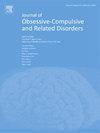Symptom dimensions of pediatric obsessive-compulsive Disorder: Exploratory examination of associations with clinical features and response to cognitive-behavioral therapy
IF 1.5
4区 医学
Q3 PSYCHIATRY
Journal of Obsessive-Compulsive and Related Disorders
Pub Date : 2025-07-01
DOI:10.1016/j.jocrd.2025.100969
引用次数: 0
Abstract
Several overarching symptom dimensions have been identified within pediatric obsessive-compulsive disorder (OCD), including doubting, obsessing, washing, ordering, neutralizing, and hoarding. These unique symptom presentations may have important clinical implications, especially in terms of potentially distinct associations with age, functional impairment, insight, family accommodation, and symptoms of anxiety and depression. Such symptom dimensions may also differ in their responsiveness to cognitive-behavioral therapy (CBT). Existing literature on the features associated with, and the clinical impact of, OCD dimensions has primarily focused on adults and has often employed measures that make standardized categorization of OCD dimensions across studies more challenging. In the present exploratory study, we examined the clinical features and treatment outcomes associated with different OCD symptom dimensions measured by the Obsessive-Compulsive Inventory-Children's Version (OCI-CV) using data from a previously completed clinical trial. A secondary analysis of data collected from 161 primarily White/non-Hispanic youth (Mage = 12.19) enrolled in a randomized control trial of d-cycloserine-augmented CBT with exposure and response prevention revealed differential relations between clinical features and OCD symptom dimensions at baseline, particularly related to doubting symptoms which were associated with all measured clinical features except insight. However, the rate of improvement in OCD symptom severity during CBT did not differ as a function of OCD symptom dimension. The present study provides evidence that youth can benefit from CBT despite differences in clinical features associated with OCD symptom dimensions. Findings suggest that mental health providers can deliver idiographically tailored gold standard CBT flexibly to youth regardless of OCD symptom dimensionality.
儿童强迫症的症状维度:与临床特征和对认知行为治疗反应的探索性检查
在儿童强迫症(OCD)中,已经确定了几个主要的症状维度,包括怀疑、强迫、洗涤、排序、中和和囤积。这些独特的症状表现可能具有重要的临床意义,特别是在与年龄、功能障碍、洞察力、家庭住宿以及焦虑和抑郁症状的潜在独特关联方面。这些症状维度也可能在他们对认知行为疗法(CBT)的反应上有所不同。现有的关于强迫症维度的特征和临床影响的文献主要集中在成年人身上,并且经常采用的方法使强迫症维度的标准化分类在研究中更具挑战性。在本探索性研究中,我们使用先前完成的临床试验的数据,检查了强迫症儿童版强迫症量表(OCI-CV)测量的不同强迫症症状维度的临床特征和治疗结果。对161名主要为白人/非西班牙裔青年(Mage = 12.19)的数据进行了二次分析,这些数据参加了一项d-环丝氨酸增强CBT暴露和反应预防的随机对照试验,结果显示临床特征和强迫症症状维度在基线时存在差异,特别是与怀疑症状相关的差异,这些症状与所有测量的临床特征相关,除了洞察力。然而,在CBT期间,强迫症症状严重程度的改善率作为强迫症症状维度的函数没有差异。本研究提供的证据表明,尽管与强迫症症状维度相关的临床特征存在差异,但青少年可以从CBT中获益。研究结果表明,无论强迫症症状维度如何,心理健康提供者都可以灵活地为青少年提供个性化定制的金标准CBT。
本文章由计算机程序翻译,如有差异,请以英文原文为准。
求助全文
约1分钟内获得全文
求助全文
来源期刊
CiteScore
4.00
自引率
5.60%
发文量
46
审稿时长
47 days
期刊介绍:
Journal of Obsessive-Compulsive and Related Disorders (JOCRD) is an international journal that publishes high quality research and clinically-oriented articles dealing with all aspects of obsessive-compulsive disorder (OCD) and related conditions (OC spectrum disorders; e.g., trichotillomania, hoarding, body dysmorphic disorder). The journal invites studies of clinical and non-clinical (i.e., student) samples of all age groups from the fields of psychiatry, psychology, neuroscience, and other medical and health sciences. The journal''s broad focus encompasses classification, assessment, psychological and psychiatric treatment, prevention, psychopathology, neurobiology and genetics. Clinical reports (descriptions of innovative treatment methods) and book reviews on all aspects of OCD-related disorders will be considered, as will theoretical and review articles that make valuable contributions.
Suitable topics for manuscripts include:
-The boundaries of OCD and relationships with OC spectrum disorders
-Validation of assessments of obsessive-compulsive and related phenomena
-OCD symptoms in diverse social and cultural contexts
-Studies of neurobiological and genetic factors in OCD and related conditions
-Experimental and descriptive psychopathology and epidemiological studies
-Studies on relationships among cognitive and behavioral variables in OCD and related disorders
-Interpersonal aspects of OCD and related disorders
-Evaluation of psychological and psychiatric treatment and prevention programs, and predictors of outcome.

 求助内容:
求助内容: 应助结果提醒方式:
应助结果提醒方式:


